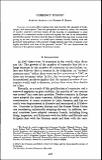| dc.contributor.author | Alesina, Alberto | |
| dc.contributor.author | Barro, Robert | |
| dc.date.accessioned | 2010-11-08T21:44:49Z | |
| dc.date.issued | 2002 | |
| dc.identifier.citation | Alesina, Alberto, and Robert J. Barro. 2002. Currency unions. Quarterly Journal of Economics 117(2): 409-436. | en_US |
| dc.identifier.issn | 0033-5533 | en_US |
| dc.identifier.uri | http://nrs.harvard.edu/urn-3:HUL.InstRepos:4551795 | |
| dc.description.abstract | Common currencies affect trading costs and, thereby, the amounts of trade, output, and consumption. From the perspective of monetary policy, the adoption of another country's currency trades off the benefits of commitment to price stability (if a committed anchor is selected) against the loss of an independent stabilization policy. We show that the type of country that has more to gain from giving up its own currency is a small open economy heavily trading with one particular large partner, with a history of high inflation and with a business cycle highly correlated with that of the potential "anchor." We also characterize the features of the optimal number of currency unions. | en_US |
| dc.description.sponsorship | Economics | en_US |
| dc.language.iso | en_US | en_US |
| dc.publisher | MIT Press | en_US |
| dc.relation.isversionof | http://dx.doi.org/10.1162/003355302753650283 | en_US |
| dash.license | LAA | |
| dc.title | Currency Unions | en_US |
| dc.type | Journal Article | en_US |
| dc.description.version | Version of Record | en_US |
| dc.relation.journal | Quarterly Journal of Economics | en_US |
| dash.depositing.author | Alesina, Alberto | |
| dc.date.available | 2010-11-08T21:44:49Z | |
| dc.identifier.doi | 10.1162/003355302753650283 | * |
| dash.contributor.affiliated | Barro, Robert | |
| dash.contributor.affiliated | Alesina, Alberto | |


